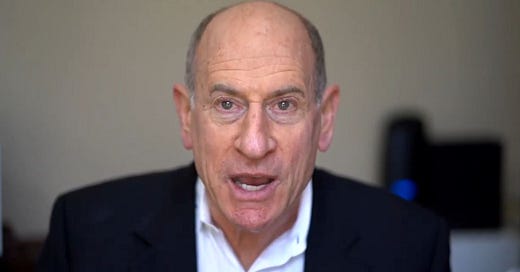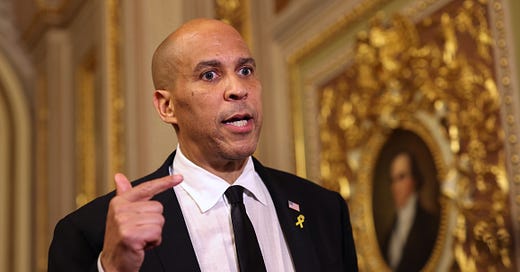
Phil Heimlich was a late entrant into the Republican primary for Ohio’s 8th Congressional District. He’s a guy with a famous last name—his dad invented the maneuver everyone learns in First Aid class. And he wants to help turn the GOP into a responsible political party again.
He has already had a long career in politics: as a former assistant county prosecutor in Hamilton County (home of Cincinnati); as a member of the Cincinnati city council; and as Hamilton County supervisor. He’s been out of politics since 2007, when he briefly ran a House primary campaign, but dropped out after concluding there was no path to victory. In the meantime, he’s been on the speaking circuit, writing op-eds, and hosting a podcast called “Hard Truths.”
The boundaries of the 8th district haven’t been finalized because the state legislature’s Republicans are still battling with the Ohio Supreme Court over the map. (Ohio lost a seat in the most recent census.) But the district is expected to run along Ohio’s western border from Cincinnati’s northern suburbs up to near Celina and Lake St. Mary’s. It will not, by any means, be a swing district.
How will a sensible, semi-retired Republican challenge a sitting congressman for the nomination in a safe district in a red state?
When I spoke with Heimlich, the first question was why now? Why didn’t he run for Rob Portman’s House seat when President Bush named Portman the U.S. trade representative in 2005?
“Strictly family,” Heimlich tells me. “We had a 2-year-old son and my wife was pregnant with our second child. And I felt very strongly that I did not want to be away from my kids four or five days a week. And I'm kind of a workaholic, a bit of a perfectionist, and I'm the kind of guy that if I'm working on something I'm going to stay there until I get it done.”
But now? “I have a nice life here, but I feel compelled because our democracy is under attack with voter suppression. That's going on, putting hacks in place of people like the Georgia Secretary of State Brad Raffensperger and other people like that. We all know what's happening.” Heimlich is 69 now. His son is off to college and his daughter is an upperclassman in high school. His kids are leaving the nest and he’s motivated by the GOP’s voter suppression, Trump’s big lie, and the attempt to overturn the 2020 presidential election. He’s determined to take the message to Ohio voters, and, if successful, the nation. He’s determined to reclaim the Republican party.
Heimlich’s primary opponent, Warren Davidson, is the sitting representative of the current version of the 8th District. Heimlich’s webpage says that Davidson “sided with the January 6 rioters,” and it is indeed true that Davidson voted to overturn the election—though in his defense, he has condemned the insurrectionists while seemingly trying to have it both ways, talking about auditing the results and “numerous systemic issues” in Arizona and Pennsylvania. Maybe Davidson takes insurrection seriously but not literally.
Heimlich also hits Davidson for his COVID extremism: “There are, as far as I can tell, only two members of the House who have sent out comparisons between Nazi practices and COVID measures. One is Marjorie Taylor Greene. The other is the person I'm running against: Warren Davidson.”
To give you a sense of what kind of Republican Heimlich is, he says, “I'm willing to follow Liz Cheney and Anthony Gonzalez, people like that who have stood up for what's right. And who have stood up for our democracy.” He says that there “is a clear distinction so people can choose: Do they want Liz Cheney or do they want Marjorie Taylor Greene?”
That’s an interesting question.
Davidson apologized for but did not delete his Nazi-COVID tweet, which really is something to behold:

In addition to that tweet putting Davidson in the same company as Marjorie Taylor Greene, it’s worth noting that Davidson was one of only 18 House Republicans to vote against a resolution that condemned the QAnon conspiracy theory.
The choice couldn’t be clearer. A longtime public servant or the insurrection / Nazi / Q guy. Whom will Ohio Republicans prefer?
Heimlich’s big liability is that he is Never Trump in the truest sense of the term. He serves as a legal adviser for Republicans for the Rule of Law and cut a video for Republican Voters Against Trump. (Disclosure: Both groups were once sister organizations of The Bulwark.) And being Never Trump means that he’s voted for a lot of Democrats in recent years—which is a challenge in a district where the Republican typically wins by Saddam Hussein margins.
His plan is to “put together a coalition of what I call reasonable Republicans . . . who are going to stand up for law and order, stand up for the rule of law.” Since Ohio allows voters to change their party registration the day of the election, he’s hopeful that some Democrats in the district will cross over and vote for him, too. He needs them, frankly. He even cut a video recently with an appeal:
The question is whether Democratic voters will realize this in time. Sure, switching parties would make them “Republicans” until they switch back at the next election, but the Democrat won’t win this race and voting for Heimlich would give them the opportunity to deal a blow to the Jim Jordan wing of the GOP.
That said, make no mistake: Heimlich is very much a conservative. David Pepper, who dealt Heimlich his only electoral defeat, tells me Heimlich “had a major-league brand in this part of the state. . . . Phil Heimlich was the guy who was very aggressively cutting taxes. His image was tough on crime. So he was not some moderate. No one would have called him a RINO. He was the conservative brand, and it was a very developed brand.”
“We had a knock-down, drag-out for county commission,” Pepper continues. “I mean, this was a fierce race. You would never in a million years think a decade later, I would, you know, have the good things to say that I will say about Phil Heimlich. He is really serious about calling out his own party for going astray, in his mind.”
Heimlich didn’t just call out his party. He cut a video detailing why Ohio’s Republicans had failed to push back on Trump, calling them “cowardly.” He called on voters to join him in voting for the Democratic ticket in 2018. And all the while he insisted that he has never stopped being a conservative.
Pepper anticipates a hard-fought primary, noting that Davidson has never really been pushed. He says, “Heimlich is tough. He's got a backbone that most of these folks don't seem to have.”
Heimlich is good on camera while Davidson has a flat debate style, though it’s too early to know whether Heimlich will even be able to get Davidson onstage. Incumbents often duck debates and the primary is in May.
Then there’s the question of money. We won’t know how much money Heimlich will raise in these two short months. But fundraising was, at one point, his bailiwick. Long before Citizens United, a 1997 CNN article observed: “Phil Heimlich . . . is famous for raising more campaign money than anyone in Cincinnati City Council history.” Heimlich told CNN: “I raise more money because I work harder at it, it's that simple.”
Campaigns cost a lot more these days, especially congressional races, and Heimlich tells me by running a sort of national campaign, campaigning against Trumpism and its many sins, he hopes that money will come in for him like it has for Liz Cheney.
And the reason is, I think, there is an admiration throughout this country for Republicans who are willing to stand up to Trumpism. There's just a sense that these are people who are acting on principle and not just out of self-interest. . . . I think people recognize that it's not just one seat, which is important, but it's setting an example. That if we can beat a guy who is essentially a Jim Jordan protegé, we can beat this guy. Then other people can follow and do the same in 2024.
And what if Heimlich does win? Would he support Kevin McCarthy for speaker? “Never. I’m not going to vote for anybody who doesn’t stand up to Trump and Trumpism. Would never do it.”
Then what about Nancy Pelosi?
Well, I’m not sure I would. I’m not sure I’d vote for a Democrat [for House speaker], truthfully. . . . I’d have to see who's running, especially. I’d obviously prefer to vote for Liz Cheney or somebody like that on our side.
That is, if Liz Cheney is still in Congress.
There are a few ways to look at Phil Heimlich’s run. You could see it as a doomed crusade on behalf of an idea that no longer exists. Or, if you were so inclined, you could see it as a green shoot—an example of the Republican party self-organizing, at the molecular level, to begin the process of unwinding itself from Trumpism.
Whatever perspective you choose, Heimlich is, himself, a profile in tremendous courage. It’s easy to go along. And switching sides isn’t, as a practical matter, all that hard either.
But to step back into public life for the sole purpose of testifying to the truth, knowing the trouble it will bring?
It’s like the epistemological opposite of grifting. You’re tempted to say that such a man has no place in modern politics.
And at the same time, you hope you’re wrong.











